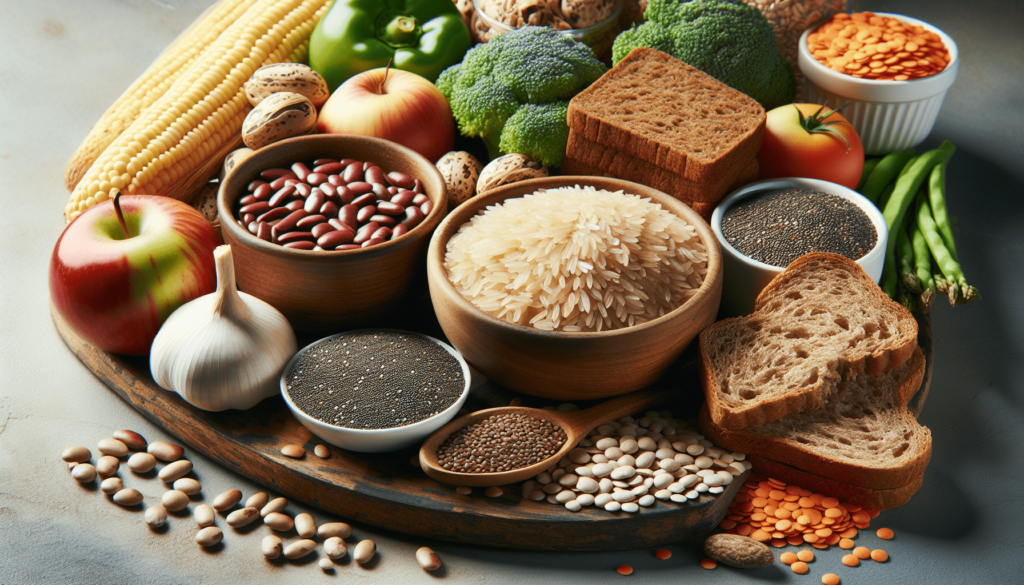Imagine a world where you could improve your digestion, boost your immune system, and lower your risk of chronic diseases, all by simply adding a specific type of food to your diet. Well, that world exists, and it’s called the world of functional foods. Among the many options available, fiber stands tall as a star player. Not only does it keep your digestive system running smoothly, but it also provides a wide range of other health benefits. In this article, we’ll explore the incredible advantages of fiber as a functional food and discover why it should become a staple in your daily meals.

Improves Digestive Health
Adding fiber to your diet can greatly improve your digestive health. One of the key benefits of fiber is that it increases stool bulk, making it easier for your body to pass waste. This can help prevent constipation and promote regular bowel movements. By keeping your digestive system healthy and regular, fiber also reduces the risk of developing hemorrhoids, a painful condition that affects the veins in the anus and rectum.
Normalizes Blood Sugar Levels
If you struggle with fluctuating blood sugar levels or are at risk of developing type 2 diabetes, incorporating fiber into your diet can be highly beneficial. Fiber slows down the digestion and absorption of carbohydrates, which helps regulate blood sugar levels. By preventing sudden spikes and drops in blood sugar, fiber reduces the risk of developing type 2 diabetes, a chronic condition that affects how your body processes sugar.
Supports Weight Management
If weight management is a concern for you, fiber can be a valuable tool. One of the main ways fiber helps is by providing a feeling of fullness. When you consume high-fiber foods, you tend to feel satisfied and less inclined to overeat. Additionally, fiber reduces calorie intake by adding bulk to your meals without adding extra calories. This can assist with weight loss and help you maintain a healthy weight in the long run.

Lowers Cholesterol Levels
High cholesterol levels are a major risk factor for heart disease. However, consuming a diet rich in fiber can help lower cholesterol levels and reduce this risk. Fiber binds to cholesterol in the digestive system, preventing it from being fully absorbed into the bloodstream. By reducing cholesterol absorption, fiber also lowers LDL (bad) cholesterol levels. This not only promotes heart health but also decreases the likelihood of developing heart-related problems in the future.
Promotes Heart Health
In addition to lowering cholesterol levels, fiber offers numerous benefits for heart health. It has been shown to lower blood pressure, which is a major risk factor for heart disease. By reducing inflammation in the body, fiber also supports the overall health and function of the heart. Furthermore, fiber helps prevent plaque buildup in the arteries, which can lead to blockages and increase the risk of heart attacks and strokes. By incorporating fiber into your diet, you can take significant steps towards maintaining a healthy heart.
Aids in Weight Loss
Many individuals struggle with managing their weight, but the inclusion of fiber in your diet can greatly aid in weight loss efforts. Fiber increases satiety, meaning it makes you feel fuller for longer periods of time. This reduces food cravings and helps control portion sizes, making it easier for you to maintain a healthy diet. Additionally, high-fiber foods are often nutrient-dense, meaning they provide important vitamins and minerals that support overall dietary quality.
Enhances Gut Health
The health of your gut is essential for overall well-being, and fiber plays a crucial role in enhancing gut health. Fiber acts as a prebiotic, providing nourishment for beneficial gut bacteria. By promoting the growth of these healthy bacteria, fiber improves gut microbiome diversity, which is linked to a healthy immune system. A healthy gut is also important for proper digestion and nutrient absorption, so incorporating fiber into your diet can have far-reaching benefits.
Reduces the Risk of Certain Cancers
One of the most important benefits of fiber is its ability to reduce the risk of certain types of cancer. Studies have shown that a high-fiber diet can significantly lower the risk of colorectal cancer, which affects the colon and rectum. Additionally, fiber may provide protection against other types of cancer, although more research is needed to fully understand these relationships. By including fiber in your diet, you can help remove toxins from the body and support its natural detoxification processes, reducing the risk of developing cancer.
Regulates Appetite
If you struggle with overeating or maintaining portion control, fiber can help regulate your appetite. High-fiber foods control hunger hormones, making you feel more satisfied and less likely to overeat. This helps maintain a healthy weight and provides sustained energy throughout the day. By including fiber in your meals and snacks, you can feel more in control of your appetite and make healthier choices throughout the day.
Improves Skin Health
Believe it or not, fiber can even benefit your skin health. By promoting healthy digestion and nutrient absorption, fiber ensures that your body receives the necessary vitamins and minerals to support the growth of healthy skin cells. Additionally, fiber helps remove toxins from the body, which can reduce the risk of developing skin conditions. By including fiber in your diet, you can improve your overall skin health and enhance your natural glow.
Incorporating fiber-rich foods into your diet is a simple and effective way to improve your overall health and well-being. From promoting digestive health and regulating blood sugar levels to supporting weight management and reducing the risk of certain diseases, fiber offers a multitude of benefits. To reap these advantages, aim to consume a variety of high-fiber foods such as whole grains, fruits, vegetables, legumes, and nuts. By embracing fiber as a functional food, you can take significant steps towards achieving optimal health and vitality.
